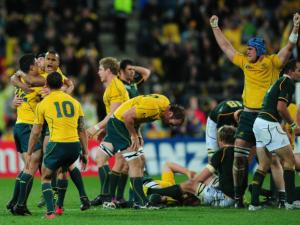
I’m still recovering from the 1-2 punch of the Boks being ousted from the IRB Rugby World Cup and Bafana Bafana getting pipped at the wire for a berth in the finals of the African Cup of Nations on a dubious tiebreaker. The frustrations derive from different sources, however.
As an almost universal rule I try not to by into “the better team lost” arguments in team sports where the only measure of “better” comes via the scoreboard. After all, by better do we mean more aesthetically? More fundamentally sound? More statistically dominant? Winning makes a team better and being better means a team wins.
But the Australia game, an in many ways ugly but thrilling 11-9 Wallaby win in a clash of two global rugby titans, puts my reductionist view of sporting superiority to the test. The Boks went in as the favorites and by almost any measure dominated the game against Australia. They controlled possession. They dominated territory. But they could not push the tries across, and the two times they did put the ball down across the line the referee blew the whistle for forward passes. Australia capitalized on Springbok failures and mistakes and took advantage of a bit of luck and a lot of dubious refereeing. In that sense, and by the all-important scoreboard, I have to agree with Wallabies coach Robbie Deans when he says that his team deserved to win.
Or at least I have to agree intellectually. It doesn’t sit well with me emotionally, though. And I think the universal consensus is that Coach Peter DeVilliers is on his way out the door.
Bafana Bafana brings up a different set of frustrations. Basically, after losing to Niger a few weeks back South Africa believed it was left needing a win or a tie and for Egypt to defeat Niger by more than one goal in order to advance to the African Cup of Nations finals. That, optimistic Bafana officials believed, would grant them the tiebreaker on point differential. And they thought this for a simple reason — that is the general rule for FIFA tournaments the world over, including the World Cup and European championships.
And so things played out according to script. Egypt, long out of the tournament in crushingly disappointing fashion, nonetheless showed up to play against Niger, winning 3-0 in Cairo. Bafana played to a rather desultory draw, in part because Coach Pitso Mosimane had told them to play for the tie upon learning that Niger had dug themselves a hole that they were not going to get out of. When the game ended in a 0-0 draw the team and its officials and the media and just about everyone celebrated. Making the finals of the continental showcase is still a big deal even though it is frankly embarrassing that South Africa has sunk to such levels that just making the finals of the CAF tournament is cause for revelry.
But hold the phones. It turns out that CAF has its own rules, and those included a tiebreaker that included head-to-head competition. By winning their last matchup in Niamey Niger stamped their ticket to Gabon and Guinea next year. South Africa is protesting the decision, but let’s be realistic. They are unlikely to get a favorable ruling from either CAF or, if a protest gets that far, FIFA, though the sport’s international governing body might encourage the African body to change their rules going forward.
Oh, and things kind of stink in South African cricket, too.